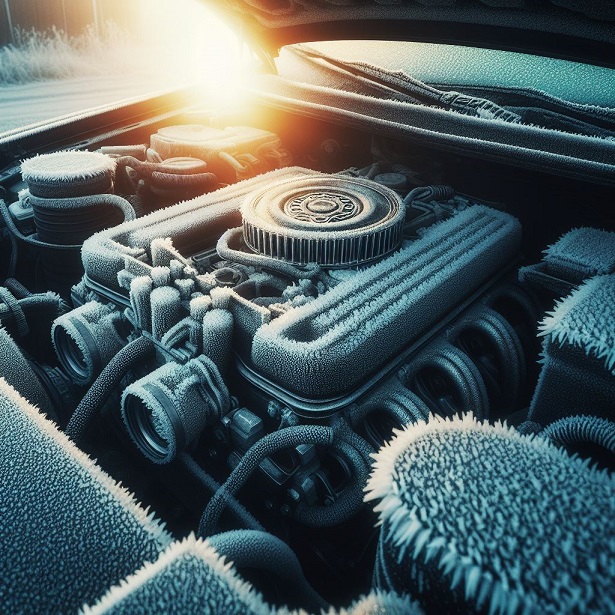Have you ever experienced a strange knocking sound when starting your car on a cold morning? This phenomenon, commonly known as engine knock on cold startup or cold start engine knock, can be a sign of trouble. In this section, we will take a closer look at the causes of engine knock on cold startup, how to detect it, troubleshoot and fix it, and, most importantly, how to prevent it from happening in the future.

Key Takeaways:
- Cold start engine knock is a common issue that can impact your vehicle’s performance and longevity.
- Understanding the causes of engine knock on cold startup, such as fuel quality, spark timing, and lubrication, is crucial for troubleshooting and resolving the problem effectively.
- Detecting engine knock at startup involves paying attention to distinct noises and vibrations and being aware of warning signs that can prevent potential damage.
- Troubleshooting and fixing engine knock on cold startup involves practical steps, including DIY solutions and possible repairs, such as checking spark plugs, fuel injectors, and air filters.
- Preventive measures, such as using high-quality fuel, performing regular maintenance, and allowing your vehicle to warm up before driving off, can help avoid engine knock during cold starts.
Understanding Cold Start Engine Knock
When you start your car on a cold morning, you may notice a knocking sound or vibration coming from the engine. This is known as engine knock on cold startup and is a common issue that many drivers experience. To understand how to fix this problem, it’s important to first understand its causes.
The most common cause of engine knock on cold startup is fuel quality. If the fuel you’re using contains too much ethanol, it can lead to incomplete combustion, causing the engine to knock. Additionally, the spark timing may be off, resulting in uneven combustion and engine knock. Improper lubrication can also cause engine knock, as the lack of lubrication can result in metal-to-metal contact and increased friction.
Another factor that may contribute to engine knock on cold startup is the temperature of the engine. When the engine is cold, the fuel may not vaporize as quickly, leading to incomplete combustion and engine knock. This is why you should allow your car to warm up for a few minutes before driving off on a cold morning.
In some cases, engine knock on cold startup may be a result of worn spark plugs or fuel injectors. These components are responsible for igniting the fuel in the engine, and when they are worn, they may not be doing their job effectively. In this case, replacing them may be necessary to resolve the engine knock issue.
Overall, understanding the causes of engine knock on cold startup is crucial in troubleshooting and resolving the problem effectively. By addressing fuel quality, spark timing, lubrication, engine temperature, and worn components, you can eliminate engine knock and improve the performance and longevity of your vehicle.
Detecting Engine Knock at Startup
When starting your vehicle in cold weather, you may hear an unusual noise referred to as engine knock. This sound may be accompanied by vibrations, indicating that something is not right. Engine knock is a serious issue that can cause severe damage to your engine if left unaddressed. Therefore, it is crucial to identify it early and take appropriate action.
The distinct noise of engine knock can be described as a knocking, ticking, or rattling sound. It may be louder when you accelerate or decrease when you put the vehicle in gear. If you hear these sounds, it is likely that your car is experiencing engine knock. Other warning signs may include a decrease in power, poor fuel economy, or a misfire.
It is important to distinguish engine knock from other engine-related sounds, such as a loose belt or a faulty starter. One way to differentiate engine knock is by paying attention to when it occurs. Engine knock usually happens during cold startup, while other sounds may happen at any time.
If you suspect that your vehicle is experiencing engine knock, it is recommended that you have it inspected by a mechanic. They will be able to determine the exact cause of the problem and suggest the appropriate course of action. Ignoring engine knock can lead to more severe and costly damage to your engine, so it is best to address it promptly.
Troubleshooting and Fixing Engine Knock on Cold Startup
If you’re experiencing engine knock on cold startup, don’t worry – there are several troubleshooting steps you can take to resolve the issue.
The following tips can help you fix engine knock on cold startup:
- Check your spark plugs: Worn or faulty spark plugs can cause engine knock, especially in cold weather. Make sure your spark plugs are clean and properly tightened.
- Check your fuel injectors: Dirty fuel injectors can also cause engine knock. Try cleaning them or replacing them if necessary.
- Check your air filter: A clogged air filter can reduce airflow to the engine, causing it to knock. Replace your air filter if it’s dirty or clogged.
- Use higher quality fuel: Lower quality gasoline can sometimes cause engine knock. If you’re using regular unleaded, try using mid-grade or premium gasoline instead.
- Consider using fuel additives: Certain fuel additives, such as octane boosters or fuel system cleaners, can help reduce or eliminate engine knock.
- Check your timing: If your engine’s timing is off, it can cause engine knock. Have your timing checked by a professional mechanic if you suspect this is the problem.
- Check your lubrication: Low oil pressure or dirty oil can cause engine knock. Make sure your oil levels are correct and your oil is clean and fresh.
If none of these solutions work, it may be time to bring your vehicle to a professional mechanic for a more in-depth inspection.
Remember, if you ignore engine knock on cold startup, it can lead to more serious engine damage in the long run. So, addressing the issue promptly is important to maintain the performance and longevity of your vehicle.
Preventing Engine Knock on Cold Start
Now that you understand the causes and solutions for engine knock on cold start-ups, it’s important to take preventative measures. By implementing some simple practices, you’ll be able to minimize the occurrence of engine knock and protect your vehicle’s engine.
- Use high-quality fuel: Poor fuel quality can contribute to engine knock, so be sure to purchase gasoline from a reputable gas station.
- Perform regular maintenance: Keep up with routine maintenance such as oil changes, air filter replacements, and spark plug inspections to ensure optimal engine performance.
- Allow your vehicle to warm up: Let your car idle for a few minutes to allow the engine oil to circulate before driving off.
- Avoid sudden acceleration: Abrupt acceleration can cause engine knock, especially on cold days, so ease into your driving.
By following these tips, you’ll be able to prevent engine knock on cold starts and extend the life of your vehicle’s engine.
Conclusion
In summary, experiencing engine knock on cold startup is a common issue that can affect the performance and longevity of your vehicle. By understanding the causes of engine knock during cold starts and detecting it early, you can take appropriate measures to troubleshoot, fix, and prevent the problem. Regular maintenance, using high-quality fuel, and allowing your car to warm up before driving off are some of the preventive measures that you can take to avoid engine knock.
Remember to pay attention to warning signs and seek professional help if necessary. By following these guidelines, you can enhance the overall performance and lifespan of your vehicle. So, if you hear engine knock on cold startup, don’t ignore it – take action to address the issue promptly. With these tips and tricks, you’ll be able to enjoy a smooth and quiet cold start every time.


